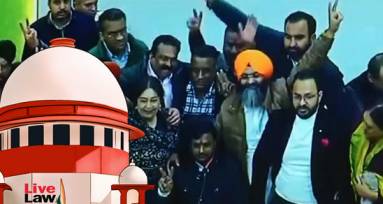Travesty in Chandigarh: On mayoral election and the Supreme Court of India’s remarks
Manner in which mayor poll was manipulated has grave implications for democracy
The Supreme Court of India’s stinging remarks on the manner in which the Mayor of Chandigarh was elected has confirmed suspicion that the victory of Manoj Sonkar, the Bharatiya Janata Party (BJP) candidate was obtained through manipulation . After viewing footage of the videographed electoral process, the Chief Justice of India found it appalling that the presiding officer himself appeared to be defacing the ballots, and termed it a “ mockery of democracy”. Many had noted as soon as the election was called in favour of the BJP that it was a travesty that took-place on January 30, as eight votes cast by elected councillors were declared invalid. The election held on January 30 itself was based on a direction from the Punjab and Haryana High Court. Earlier, it was due to be held on January 18, but it was deferred to February 6 at the last minute as it was disclosed that Anil Masih, a nominated councillor and a BJP minority wing functionary , fell-ill . However, thanks-to the court’s intervention , it was advanced to January 30. The Congress and the Aam Aadmi Party (AAP) allege that the election was put-off only because two parties, which were contesting jointly, were set to win. AAP has 13 members and the Congress seven in the Corporation, but the AAP candidate Kuldeep Kumar polled only 12 votes, with eight votes being declared invalid. Mr. Sonkar, with 16 votes, was declared the winner.
The Mayor is chosen by the 35 elected Councillors and the Member of Parliament for Chandigarh. A simple method for a comparatively small elected body choosing its mayor is by a show of hands or the members rising in support of the respective candidates. That they had to record their preferences through voting slips indicates that there was suspicion of possible cross-voting. What made the process dubious was that Mr. Masih, who presided over the election, was accused of not showing the ‘invalid’ ballot papers to the candidates. As a result , no one knew why exactly these votes, presumably those that ought-to have gone to the AAP candidate, were declared invalid. The apex court has done the right thing in ordering the ballots and the records be handed over to the High Court’s Registrar-General and the proposed Corporation meeting postponed until further orders. The development may concern only one municipal corporation in the country, but the idea that an election can be so brazenly rigged has grave implications for democracy. A political party seeking to be re-elected for a third consecutive term at the national level cannot be seen as manipulating any election in this manner. Only a verdict invalidating the election and ordering a fresh one, with safeguards against manipulation, will be in the interest of justice.
